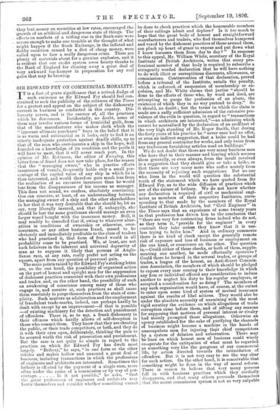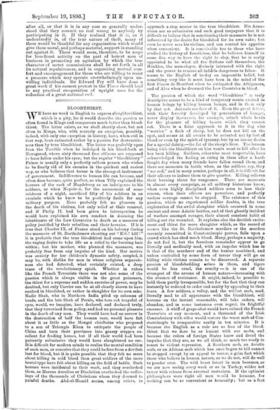SIR EDWARD FRY ON COMMERCIAL MORALITY. TT is a fact
of grave significance that a retired Judge of -1- such eminence as Sir Edward Fry should feel con- strained to seek the publicity of the columns of the Times for a protest and appeal on the subject of the dishonesty current in business as conducted in this country. Dis- . honesty covers, and is the essence of, all the practices which he denounces. Incidentally, no doubt, some of them may involve various forms of homicidal guilt, from that of the manufacturer who makes cloth which the ignorant ultimate purchaser" buys in the belief that it is as warm and substantial as it looks, only to find it an . utterly inadequate protection against deadly chills, up to . that of the man who over-insures a ship in the hope, well founded on a knowledge of its condition and the perils it . will have to meet, that it will never reach port. In the . opinion of Mr. Robinson, the editor of Fairplay, this . latter form of fraud does not now take place, for the reason . that the " managing owner," who in practice effects . insurances of vessels, frequently holds only a small per- , centage of the capital value of any ship in which he is thus interested, and would therefore gain much less from the realisation of an excessive insurance than he would lose from the disappearance of his income as manager. This does not sound, we confess, absolutely convincing. One can conceive, at least, of an understanding between the managing owner of a ship and the other shareholders in her that it was very desirable that she should be, let us . say, very liberally insured, and that if, unhappily, she should be lost the same gentleman should manage an even larger vessel bought with the insurance money. Still, it may readily be conceded that if, owing to whatever alter- ations in conditions of ownership or otherwise, over- insurance, or any other business fraud, ceased to be obviously and immediately profitable to the class of traders who had practised it, that form of fraud would in all probability cease to be practised. We, at least, are not such believers in the inherent and universal depravity of man as to suppose it likely that persons of Anglo- Saxon race, at any rate, really prefer not acting on the square, apart from any question of personal gain.
The main points raised by Sir Edward Fry's striking letter are, on the one hand, the possibility of organised action on the part of honest and upright men for the suppression of dishonest practices connected with their own professions and trades, and, on the other hand, the possibility of such an awakening of conscience among many of those who engage in, and connive at, such practices as shall cause them resolutely to purge themselves from the stain of com- plicity. Such matters as adulteration and the employment of fraudulent trade-marks, indeed, can perhaps hardly be dealt with except by an improvement—if that is possible —of existing machinery for the detection and punishment of offenders. There is, so to say, a frank dishonesty in their offences which hardly allows of self-deception in those who commit them. They know that they are cheating the public, or their trade competitors, or both, and they do it with their eyes open, deliberately, thinking the gain to be secured worth the risk of prosecution and punishment. But the case is not quite so simple in regard to the . practices on which Sir Edward Fry has dwelt most largely. "Bribery," he says, "in one form or the other riddles and makes hollow and unsound a great deal of business, including transactions in which the professions of engineers and architects are interested. Sometimes the bribery is effected by the payment of a single sum, more often under the name of a commission or by way of per- centage Is it not possible," he asks, " that the great professions of engineers and architects may bestir themselves and consider whether something cannot be done to check practices which the honourable members of their callings admit and deplore? Is it too much to hope that the great body of honest and straightforward manufacturers and traders, who find themselves hampered and vexed by the dishonest practices of those around them, can pluck up heart of grace to expose and put down what I know harasses them from day to day ? " In response to this appeal, Mr. William White, secretary of the Royal Institute of British Architects, writes that every pro- fessional member of that body is required to subscribe a stringently worded declaration that he will have nothing to do with illicit or surreptitious discounts, allowances, or commissions. Contravention of that declaration, proved before a tribunal of the Institute, entails the penalty, which is enforced, of suspension of membership or ex- pulsion, and Mr. White claims that justice " should be done to the efforts of those who, by word and deed, are attempting to purge the profession of an abuse, the existence of which they in no way pretend to deny." So it should, no doubt ; but the terms in which the claim is made are a sadly sufficient admission of the extensive pre- valence of the evils in question, in regard to " transactions in which architects are interested,"—an admission which cannot be neutralised by the declaration of an architect of the very high standing of Mr. Roger Smith, that during the forty years of his practice he " never once had an offer, or even an indirect suggestion, that a bribe could be had from any general contractor for works, and only twice from any tradesman furnishing articles used on buildings."
We do not doubt that there are very many business men who have that in their manner and bearing which secures them generally, or even always, from the insult involved in a suggestion that they should give or take a bribe, or that there are very many more who suffer acutely from the necessity of rejecting such suggestions. But no one who lives in the world will question the substantial truth of the statement which we have quoted from Sir Edward Fry, as to the wide diffusion of practices which are of the nature of bribery. We do not know whether any declaration is required of civil or mechanical engi- neers as members of their respective Institutes, corre- sponding to that made by the members of the Royal Institute of British Architects, but "Civil Engineer" in the Times says that an experience of some twenty years in that profession has driven him to the conclusion that "there are very few contracting firms indeed who do not, as they term it, ' provide for the engineer' in every contract they take unless they know that it is use- less trying to bribe him." And in ordinary commerce there is no kind of check except the generally remote risk of exposure and loss of business or employment on the one hand, or conscience on the other. The question is,—Could either of these checks, or both of them, supple- menting one another, be made effectually operative ? Could there be formed in the several trades, or groups of trades, a league of the honest, an Anti-Secret Commis- sion Association, the members of which should be pledged to expose every case coming to their knowledge in which any firm or individual offered any consideration to induce another to neglect his duty to his regular employers, or accepted a consideration for so doing ? The members of any such organisation would have, of course, at the outset to enter upon some kind of system of mutual insurance against the results of libel actions. They would also be under the absolute necessity of examining with the most rigid scrutiny the evidence on which allegations of trade corruption came before them, and of sifting any reasons for supposing that motives of personal interest or rivalry had mainly prompted those allegations. Otherwise an agency established for the sake of purifying the channels of business might become a machine in the hands of unscrupulous men for injuring their chief competitors by a system of delation and subornation. There may be lines on which honest men of business could wisely co-operate for the extirpation of what must be regarded as something very like the gangrene of our commercial life, by action directed towards the intimidation of offenders. But it is not very easy to see the way clear for such action. On the other hand, it is conceivable that something might be done in the way of moral reform. There is reason to believe that very many persons fall in with business practices which they cordially disapprove, and that many others persuade themselves that the secret commission system is not so very culpable after all, or that it is in any case so generally under- stood that they commit no real wrong to anybody by participating in it. If they realised that it is, as it undoubtedly is, of the true nature of theft, many of them would be thankful for any organisation which would give them moral, and perhaps material, support in standing out against it. There would seem, therefore, to be scope for beneficent activity on the part of honest men of business in promoting an agitation by which the true character of secret commissions shall be set forth in all its natural repulsiveness, and in organising mutual com- fort and encouragement for those who are willing to resist a pressure which may operate overwhelmingly upon un- willing individuals. Sir Edward Fry will have done a great work if his earnest protest in the Times should lead to any practical co-operation of upright men for the reduction of a great national evil.



































 Previous page
Previous page